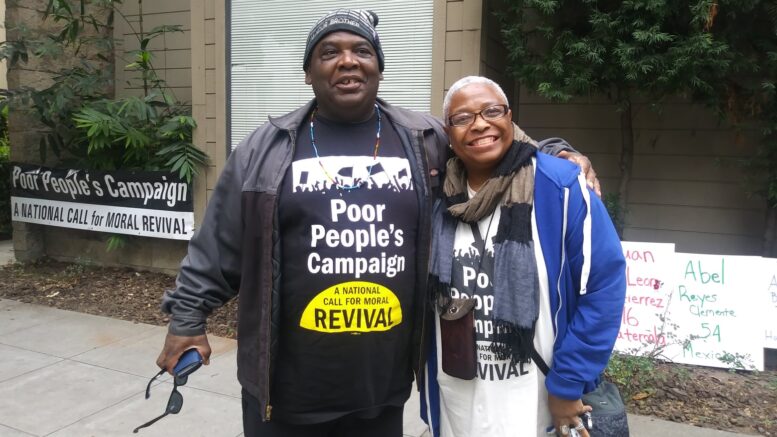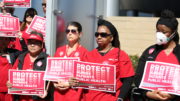Virtual town halls educate and empower the black community during the pandemic
By Faye Wilson Kennedy and Kevin Carter
In March, we began distributing food, water and face masks to unhoused people in South Sacramento and Oak Park in response to the COVID-19 outbreak. We did this as members of the Sacramento Area Black Caucus, the Sacramento Poor People’s Campaign and the Sacramento Services Not Sweeps Coalition. All three groups are focusing our collective advocacy efforts on the pandemic and how it is impacting people experiencing homelessness in our community.
What we encountered alarmed us. We saw that many of the homeless were not wearing face masks and weren’t observing social distancing. They didn’t seem to understand the danger, which was even more disturbing. When we asked, they usually replied that they didn’t have a mask or couldn’t find one.
Around the same time, we learned a dear friend and her husband were in the hospital fighting for their lives against the virus. He succumbed, but she miraculously survived.
We knew we needed to act fast. We didn’t want what happened to our friends to become our collective story. We wanted to do whatever we could to diminish the disease’s effect in our own vulnerable communities.
So in late March and early April, we issued a call to action to the black community, proposing to hold virtual town halls. Their purpose is to assemble, unify, enlighten and empower with accurate information.
The call is urgent because the black community nationwide and locally has already proven to be more affected by the COVID-19 crisis. This is especially true of our 1,500 to 2,000 unsheltered sisters and brothers in Sacramento County who don’t have access to adequate food, water or sanitation, as well as folks with underlying health-related issues, all of which is exacerbated by racism.
The local black community will be impacted by the lack of access to testing and health services and insurance; lack of accurate information (such as various myths that black folks can’t get the virus); over-representation in jails and prison; loss of income from layoffs and business closings; reduced services from black churches and faith groups; and local school closings and the digital divide that means black children will not receive a quality education through distance learning.
“We didn’t want what happened to our friends to become our collective story. We wanted to do whatever we could to diminish the disease’s effect in our own vulnerable communities.”
On May 12, we hosted our first town hall, focusing on health and well-being and featuring trusted black professionals including Olivia Kasirye, Sacramento County’s public health officer; Flojaune Cofer of Public Health Advocates; Janine Bera, chief medical officer of WellSpace Health; Kristee Haggins, a psychologist and president of Safe Black Space; Joy Johnson, a retired registered nurse and pastor with Sacramento Area Congregations Together; and Alice Baber-Banks, pastor of Christian Fellowship Ministry Church.
More than 100 people participated in the town hall, asking questions about how to safeguard the health of themselves and their families, as well as how to ensure the less fortunate in our communities have access to services during the crisis.
On Thursday, May 21, we will host the second town hall, focused on housing, dignity and justice for those experiencing homelessness. The speakers will include Kendra Lewis, executive director of the Sacramento Housing Alliance; Fatemah Bradley-Martinez of South Sacramento HART; lawyer Dale McKinney; and Janae Giles of Sacramento Loaves & Fishes.
Future topics of town halls will include youth policy, education and business. To join the conversation or assist with planning, email fayek@springmail.com.






Be the first to comment on "Sounding the alarm"